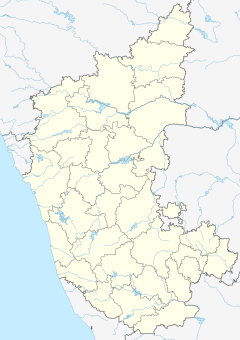Virupaksha Temple
| Virupaksha Temple | |
|---|---|

The Virupaksha or the Pampapathi temple
|
|
|
Location in Karnataka
|
|
| Geography | |
| Coordinates | 15°20′08″N 76°27′36″E / 15.3354651°N 76.4599836°E |
| Country | India |
| State | Karnataka |
| District | Bellary |
| Location | Pampa Kshetra |
| Culture | |
| Primary deity | Virupaksha (Shiva) |
| Festival deity | Virupaksha (Shiva) |
| History and governance | |
| Date built | 7th century |
| Creator | Chalukyas |
Virupaksha Temple is located in Hampi 350 km from Bangalore, in the state of Karnataka in southern India. It is part of the Group of Monuments at Hampi, designated a UNESCO World Heritage Site. Virupaksha is a form of Shiva and has other temples dedicated to him, notably at the Group of Monuments at Pattadakal, another World Heritage Site. The temple was built by Lakkana Dandesha, a chieftain under the ruler Deva Raya II of the Vijayanagara Empire.
Hampi, capital of the Vijayanagara empire, sits on the banks of the Tungabhadra River. Virupaksha Temple is the main center of pilgrimage at Hampi, and has been considered the most sacred sanctuary over the centuries. It is intact among the surrounding ruins and is still used in worship. The temple is dedicated to Lord Shiva, known here as Virupaksha, as the consort of the local goddess Pampa who is associated with the Tungabhadra River. There is also a Virupakshini Amma temple (mother goddess) in a village called Nalagamapalle, Chittoor district, Andhra Pradesh, approximately 100 km from Tirupati.
The temple's history is uninterrupted from about the 7th century. The Virupaksha-Pampa sanctuary existed well before the Vijayanagara capital was located here. Inscriptions referring to Shiva date back to the 9th and 10th centuries. What started as a small shrine grew into a large complex under the Vijayanagara rulers. Evidence indicates there were additions made to the temple in the late Chalukyan and Hoysala periods, though most of the temple buildings are attributed to the Vijayanagar period. The huge temple building was built by Lakkana Dandesha, a chieftain under the ruler Deva Raya II of the Vijayanagara Empire.
...
Wikipedia

